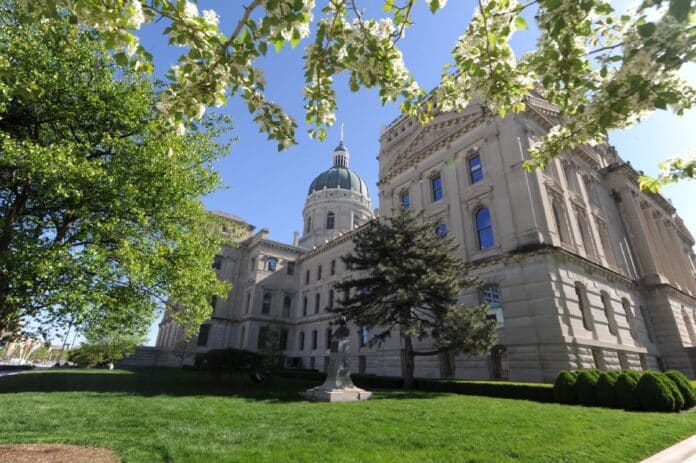As Indiana prepares to begin the redistricting process based on the most recent Census, lawmakers have planned public meetings throughout the state, including one today at Ivy Tech Community College — Columbus.
Every 10 years, the United States conducts an audit of its population, as required by the U.S. Constitution. During redistricting, legislative district lines are redrawn to accommodate population shifts and keep districts as equal as possible.
Indiana lawmakers are tasked with redrawing districts for the U.S. House of Representatives, Indiana House of Representatives and Indiana Senate.
This year, redistricting will take place in September, when the Indiana General Assembly will reconvene after a summer recess to begin the process.
Before then, members of the public can have their voices heard at a series of public meetings that began this week. There are several ways for the public to get involved, said State Rep. John Young, R-Franklin.
“Community members can attend and provide input at an upcoming meeting, watch a meeting online, and in late August, submit their own maps for consideration,” Young said in a news release. “There will also be opportunities to weigh in during the legislative process when members come back to session.”
The first area meeting is scheduled from 4 to 6 p.m. today at Ivy Tech Community College’s Columbus campus, 4475 Central Ave., Room 200 inside Poling Hall. State Sen. Jon Ford, R-Terre Haute, will chair the meeting.
The second is scheduled from 1 to 3 p.m. Wednesday in the House Chamber at the Indiana Statehouse in downtown Indianapolis. Ford and State Rep. Tim Wesco, R-Osceola, are expected to co-chair the meeting.
The meetings will be livestreamed and archived on the Indiana General Assembly’s website at iga.in.gov.
The meetings will not include any presentations, as data and maps aren’t available, organizers said. Instead, it is an opportunity for the public to talk to lawmakers about the process.
Under Indiana law, the redistricting maps are supposed to be drawn during the General Assembly’s regular session. However, in April, the session was extended until Nov. 15 after the U.S. Census Bureau delayed the release of the results due to the coronavirus pandemic. The session was extended so that Gov. Eric Holcomb would not have to call a special session.
The Census Bureau has already released apportionment data from the 2020 Census. This data determines the number of U.S. congressional districts states will have for the next 10 years. Indiana will continue to have nine U.S. congressional districts, according to the data.
State legislative districts are required to be contiguous under Indiana law. However, there are no similar requirements for U.S. congressional districts, according to Loyola University Law School.
When redrawing the districts, legislators have to make them generally proportional in terms of the population in a single district. Each district should have roughly 135,000 people, Bray said.
Official data from the 2020 Census is expected to be released around Aug. 16, and legislators are hoping they can start working on redistricting Sept. 1, he said.
Without up-to-date numbers and proposals on new state and federal districts, some Democrats across the state say Hoosiers won’t know exactly what they’re commenting on.
Many who say these forums are being held prematurely have also pushed for the establishment of an independent commission to oversee the redrawing of the legislative district maps. They argue that partisan gerrymandering has helped Hoosier Republicans gain outsized power in Congress and a supermajority in the Indiana General Assembly.
Within the state legislature, 71 of the 100 state representatives are Republican, while 39 of the 50 state senators (78%) are members of the GOP. In Congress, seven out of nine U.S. representatives from Indiana (79%) are Republican, as well as the two U.S. senators from the Hoosier State.
State Sen. Greg Walker, R-Columbus, is a majority member of both the Senate’s Elections Committee and the Interim Study Committee on Elections. While Walker will not be at Friday’s forum due to a prior commitment, he said that gerrymandering — the intentional manipulation of political boundaries to favor one party — is not as prominent in Indiana as some claim.
Using statistics that suggest 55% of Hoosiers are Republican or lean Republican, and 45% are Democrat or lean Democrat, Walker said he has problems with those who argue our state and federal lawmakers should reflect that percentage.
The only way for the majority and minority political parties to achieve proportionate seats is if all Indiana residents were evenly distributed by party affiliation along every street on every block in every county, Walker said.
“We clearly don’t live and work free of factors that make us affiliate with one party or ideology,” Walker said. “There’s our parents, our background, our education, our religion … there could be a hundred things on that list.”
Even if all neighborhoods were proportionately equal, the minority candidate (Democrats) would still face a 10 point deficit when challenging a Republican, the senator said.
“If everyone faces a 10 point spread deficit, you might elect some (Democrats) — but you are not going to elect 45%,” Walker said.
The four-term Republican also says if an independent commission redraws political boundaries to create a specific political outcome, they would also be engaged in gerrymandering.
Walker said he offered ideas to the GOP caucus that he thought would provide more tools to identify bias in redistricting. However, all of his ideas were refused by his fellow Republicans, the senator said.
“It’s really hard to get that buy-in, because redistricting is a subjective process,” the senator said. “The courts have agreed that redistricting is a political process, and it’s always hard to give up political power. It’s a human behavior process.”
Both state representatives who represent Bartholomew County — Ryan Lauer, R-Columbus, and Jim Lucas, R-Seymour — say they will attend today’s forum.
When asked his thoughts about an independent redistricting commission, Lauer said the concept has failed in several states, especially California. Such commissions are unaccountable to voters, and are often not transparent regarding outside influences.
“Lobbyists, corporate interests and special interests get very involved in that process,” said Lauer, who describes redistricting carried out by a unelected group as “a terrible idea.”
Drawing new state and federal legislative boundaries will be challenging because, based on 2019 estimates, there are areas north of Indianapolis that have grown by as much as 25%, Lauer said. There are also rural areas that have seen their population drop that will likely impact the size of several legislative districts, he said.
Lucas said he believes redistricting is an emotional issue that people are going to have an opinion on, no matter what is done.
“If you have humans drawing the boundary lines, you are always going to have some kind of personal input,” Lucas said. “So for me, I don’t think (an independent commission) would be constitutional, because it’s the constitution that puts the legislative body in charge of redistricting.”





